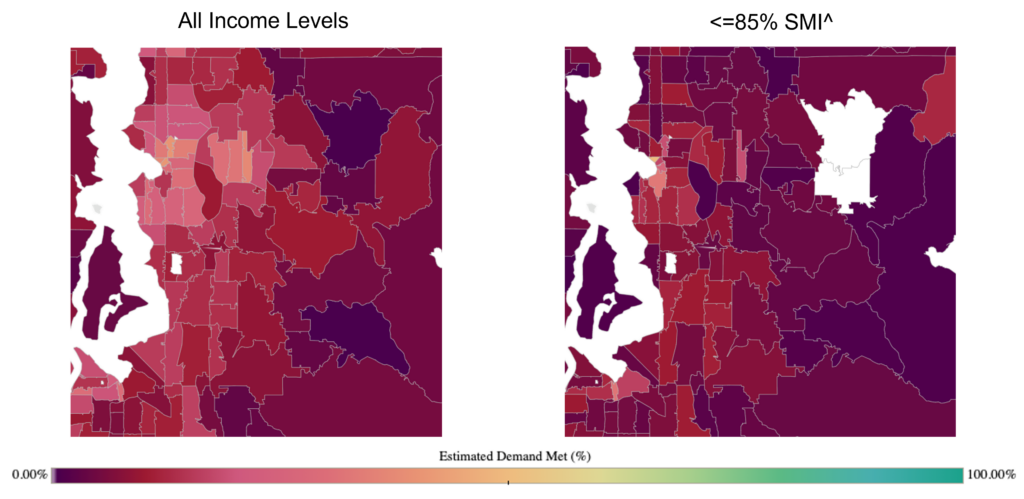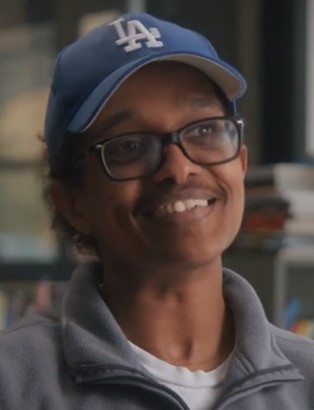Neighborhood House is working at multiple levels provide a hopeful future for children and youth in our community by offering quality early learning, partnering with schools to help families experiencing homelessness, offering Guiding Good Choices parenting classes, and creating safe spaces for young people to learn, socialize, and build leadership skills.
We know these strategies work, yet, according to our most recent Community Needs Assessment*, the youth development needs of children and youth living in King County are largely unmet. As shown in the map below, the need is even greater for children and youth with incomes of less than 85% of the State Median Income (SMI).

Source: dcyf.wa.gov

Source: US Census and Elevate Washington
In the cities of Auburn, Kent and Des Moines, the situation is much worse, with only 1 program for every 500 youth in those areas.
This need is even more acute for youth that don’t have a trusted adult in their lives. According to the King County Healthy Youth Survey, in 2021, only 66.7% of youth had an adult they could talk to about a serious issue, with Black Hispanic and Native Hawaiian/Pacific Islander adolescents significantly less likely to have an adult they can talk to.
The same survey reported youth depression prevalence was 36.4%, with South King County higher at 38.3%. Emergency department visits for suicide attempts have also increased, especially for youth ages 10-13. There are only 3 school-based health centers in south King County (1 in Renton, 2 in Highline) compared to 30 in Seattle Schools. With so few resources for youth, especially in South King County, programs like Neighborhood House’s Youth Tutoring Centers are even more critical.
Neighborhood House operates three Youth Tutoring Centers which provide out of school time youth development programs at our White Center (Seola Gardens), and Auburn (Burndale Homes and Firwood Circle) locations. Youth have a safe and enriching environment to do homework, learn about financial literacy, and develop their leadership skills. Watch this 3 minute video about Amanda, a high school student at our Burndale site and Musea Woldeselam, Neighborhood House Youth Engagement Specialist and Program Graduate.
| Youth development programs: Provide caring adults, structured and unstructured learning, and development activities; assist students in developing postsecondary and career pathways; and provide a safe and supportive environment outside of the classroom, in the school settings, the community, and the home. The legislature further finds that youth development programs have demonstrated impact and research to show that programs can improve academic and social-emotional outcomes and increase the chances that disengaged students will reengage with school. From SSB 5601 |

I came to NH when I was young and I really enjoyed the program, because it helped me when I was lost. There’s kids out there that don’t have an after school program, and they get caught into situations where they can’t come back from. We provide (youth) that space where they can still be themselves, learn how to navigate in an adult world, and be a better version of themselves.
-Musea Woldeselam, Neighborhood Housouth Engagement Specialist and Program Graduate
Neighborhood House has struggled to maintain funding and retain staff for our youth programs, in spite of growing demand for them. The Washington State Youth Development Strategy Table (YDST)** led the work on Senate Bill 5601 and House Bill 1386 in the 2023 legislative session, which would have created of a youth development office and a grant program within the Department of Children, Youth, and Families to oversee and fund youth development programs across the state. Unfortunately, both bills failed to pass. If citizens and policymakers are serious about helping youth have a hopeful future, more investment and support is needed for our school age youth during non-school hours and months. King County has 452,490 children ages 0-17, making up 20.2% of the population. They all deserve to have the opportunities to meet their full potential.
Janice Deguchi, Executive Director
*Neighborhood House’s Community Needs Assessment data focusing on youth was researched, analyzed, and written by Kate Crawford as part of her advocacy rotation through the UW School of Medicine. The finalized Community Assessment will be completed and published this fall.
**The Washington State Youth Development Strategy Table (YDST) is a coalition of youth development providers and stakeholders working to advance state-level policy and funding for expanded learning, mentoring, and school-based wraparound programming. They will continue to work towards passage of these bills in 2024. For more information or to join the coalition, please go to Youth Development Strategy Table (ydstrategy.org).
